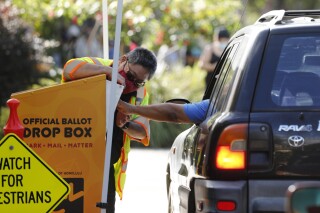Posts misrepresent the status of a bill that could disqualify Trump from the ballot in Hawaii

FILE - In this Nov. 3, 2020, file photo, an attendant helps a driver drop off a ballot on Election Day in Honolulu. Social media users are misrepresenting the status of a bill that could disqualify Trump from the ballot in Hawaii during the 2024 race. (AP Photo/Marco Garcia, File)
CLAIM: Hawaii passed a bill to keep former President Donald Trump off the ballot during the 2024 election.
AP’S ASSESSMENT: Missing context. Hawaii’s Senate Committee on Judiciary voted on Tuesday to move forward a bill that could disqualify Trump from the ballot under the U.S. Constitution’s insurrection clause. The bill passed a first vote on the Senate floor late last month and would need to pass at least two additional votes on the floor to clear the Senate and move to the House.
THE FACTS: Social media users are misrepresenting the status of the bill.
“#BREAKING: Hawaii Democrats’ bill to keep president Trump off the ballot has PASSED,” reads one post on X, formerly Twitter. “It seems Democrats are getting a little worried due to support for Trump here SOARING after Biden ABANDONED the Maui fire victims.”
It adds that “the most corrupt government in the United States is showing its true colors again” and asks whether the U.S. is “a third world country now or something.” The post had received approximately 26,000 likes and 9,800 shares as of Wednesday.
But the bill has many steps remaining, including that it must pass on the floor of both the Senate and the House, two major hurdles on its way to becoming law.
SB2392 would exclude candidates from ballots if they are disqualified under Section 3 of the 14th Amendment to the U.S. Constitution, which prohibits anyone who swore an oath to support the Constitution and then “engaged in insurrection” against it from holding public office.
“It sets up a process for removing Trump from the ballot as well as anyone else who has violated the 14th Amendment,” Hawaii state Sen. Karl Rhoads, who introduced the bill, told the AP in an email. “The Hawaii Supreme Court would be the body making that decision and of course someone would have to file a challenge. I have no plans to file a challenge personally.”
Rhoads explained that “the intent was to have a process in place to be sure that that provision of the constitution is enforced, just like the provisions on age and citizenship.”“The Legislature should probably have passed a provision like this years ago, but insurrection seemed like a moot point until Trump’s actions on January 6 and leading up to it,” he said.
The bill further states that candidates could also be disqualified from ballots under Article 16, Section 3 of the Hawaii Constitution or “another constitutional or statutory provision.” Unlike the U.S. Constitution, the Hawaii Constitution specifies that a person must have been convicted of overthrowing or attempting to overthrow the state or federal government “by force or violence” to be barred from public office.
In its final report released at the end of December, the U.S. House Jan. 6 committee asserted that Trump criminally engaged in a “multi-part conspiracy” to overturn the lawful results of the 2020 presidential election and failed to act to stop his supporters from engaging in a violent insurrection at the U.S. Capitol on Jan. 6, 2021. However, Trump has not been convicted on charges related to insurrection in a court of law.
Rhoads, a Democrat, introduced SB2392 in the Senate on Jan. 19. It passed its first vote on the Senate floor three days later and was referred to the Senate Committee on Judiciary, which Rhoads chairs. On Tuesday, the committee held a public hearing on the bill and voted to move it forward, recommending that it be passed with amendments. Three Democrats on the committee voted in favor, one with noted reservations, while one Democrat and one Republican voted against it.
The bill must pass two more votes on the Senate floor, plus votes by any other committees to which it is referred, to clear the Senate and move to the House, where the approval process will begin again. Only after it is fully passed by the House and both chambers agree on the final text will the bill be sent to the governor, who can veto it or sign it into law. If the governor does neither, the bill will become law without signature on a set date.
“The committee report has not been filed,” Rhoads told the AP. “Once that is done, it will go to the full Senate. After two votes there, if it passes, it will cross over to the House. If it passes the House, the Gov could still veto it, although I doubt he would.”
Two states, Colorado and Maine, have found that Trump’s actions on Jan. 6, 2021, to overturn his loss in the 2020 election are sufficient to keep him off the ballot in 2024 under Section 3 of the 14th Amendment. Both decisions are on hold until the U.S. Supreme Court rules on the Colorado case, which Trump appealed. The court scheduled a special session to hear arguments on Thursday.
___
This is part of AP’s effort to address widely shared misinformation, including work with outside companies and organizations to add factual context to misleading content that is circulating online. Learn more about fact-checking at AP.


